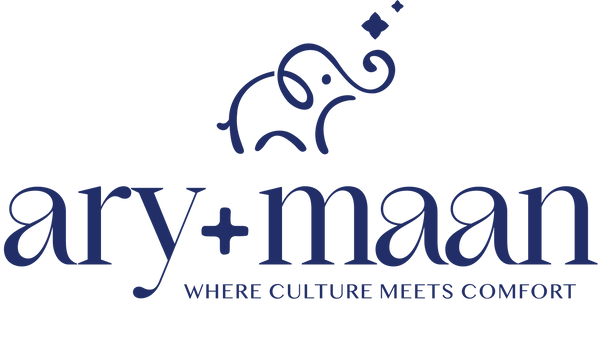At Ary + Maan, we believe our roots are not just where we come from—they’re how we carry love forward. That’s why we created the Culture & Connection Series, a space to highlight real stories from families who are weaving culture into the everyday. In our very first episode, we sat down with Sahithi, a Telugu-American woman whose reflections on identity, family, and the future moved us deeply.
Sahithi was born in Manhattan, Kansas, to immigrant parents from Andhra Pradesh, India. Her upbringing was rich in culture—Telugu was spoken at home, Indian films were always playing, and every meal was homemade with care. But what stood out most wasn’t the checklist of traditions—it was the ease with which her parents lived their heritage. They weren’t intentionally performing culture. They were just living it.
“My parents weren’t doing anything special. They were just doing what they knew. And that became my foundation.”
Culture Was the Default. Until It Wasn’t.
Growing up in a predominantly white community, Sahithi was keenly aware of her difference. But rather than feel out of place, her Indian identity became something she held even more tightly. Later, in college, she encountered a broader spectrum of what it meant to be South Asian in America—some peers knew all the prayers, others knew all the dance moves. It was in those moments that Sahithi realized how unique every diaspora story really is.
“We’re all connecting to culture in the way that makes sense to us. Some through food. Some through language. Some through fashion or dance. There’s no right or wrong.”
This perspective shift—from gatekeeping culture to celebrating its multiplicity—wasn’t always easy. Like many of us, Sahithi once questioned whether someone was “Indian enough.” But her own life, layered with nuance and love, taught her otherwise. Culture isn’t a competition—it’s a collection.
Raising the Next Generation: A Filtered Inheritance
Now newly married, Sahithi and her husband (who also speaks Telugu) are thinking about how to pass their culture forward—intentionally, but not rigidly.
They’ve talked about staying close to family, playing the same music they love, leaning on grandparents, and allowing their future children to feel culture rather than be forced into it. But they’re also thoughtful about what happens when we pass down a “filtered” version of our heritage. What parts will stick? Which pieces will get left out?
“Our kids won’t get to choose from the full picture—they’ll choose from what we give them. That’s a big responsibility.”
It’s a question many multicultural families grapple with. But as Sahithi points out, community helps fill in the gaps. Cousins, aunties, grandparents, and chosen family all contribute different filters—and together, those pieces create a meaningful mosaic.
The Power of Choosing Culture
One of the most powerful themes in our conversation was the freedom to choose—a value Sahithi’s parents gave her by not forcing tradition. It’s why she still listens to Telugu music, wears saris proudly, and lights up at the mention of Diwali.
“Nobody told me I had to do these things. I just vibed with them. And that made all the difference.”
It’s a reminder that connection doesn't have to look like devotion. It can be joyful, casual, cozy—even loud in the backseat during carpool. What matters is that it’s real. That it belongs to you.
Why We Shared This Story
At Ary + Maan, we make more than pajamas. We create everyday pieces that help families feel at home in their culture—whether that means speaking your mother tongue, dancing in your living room, or just knowing where you come from.
Sahithi’s story is one of many we’ll be sharing this year. Because behind every print, behind every pajama set, is a legacy of love, identity, and home.
📺 Watch the full episode on YouTube
📩 Want more stories like this? Subscribe to our newsletter.

